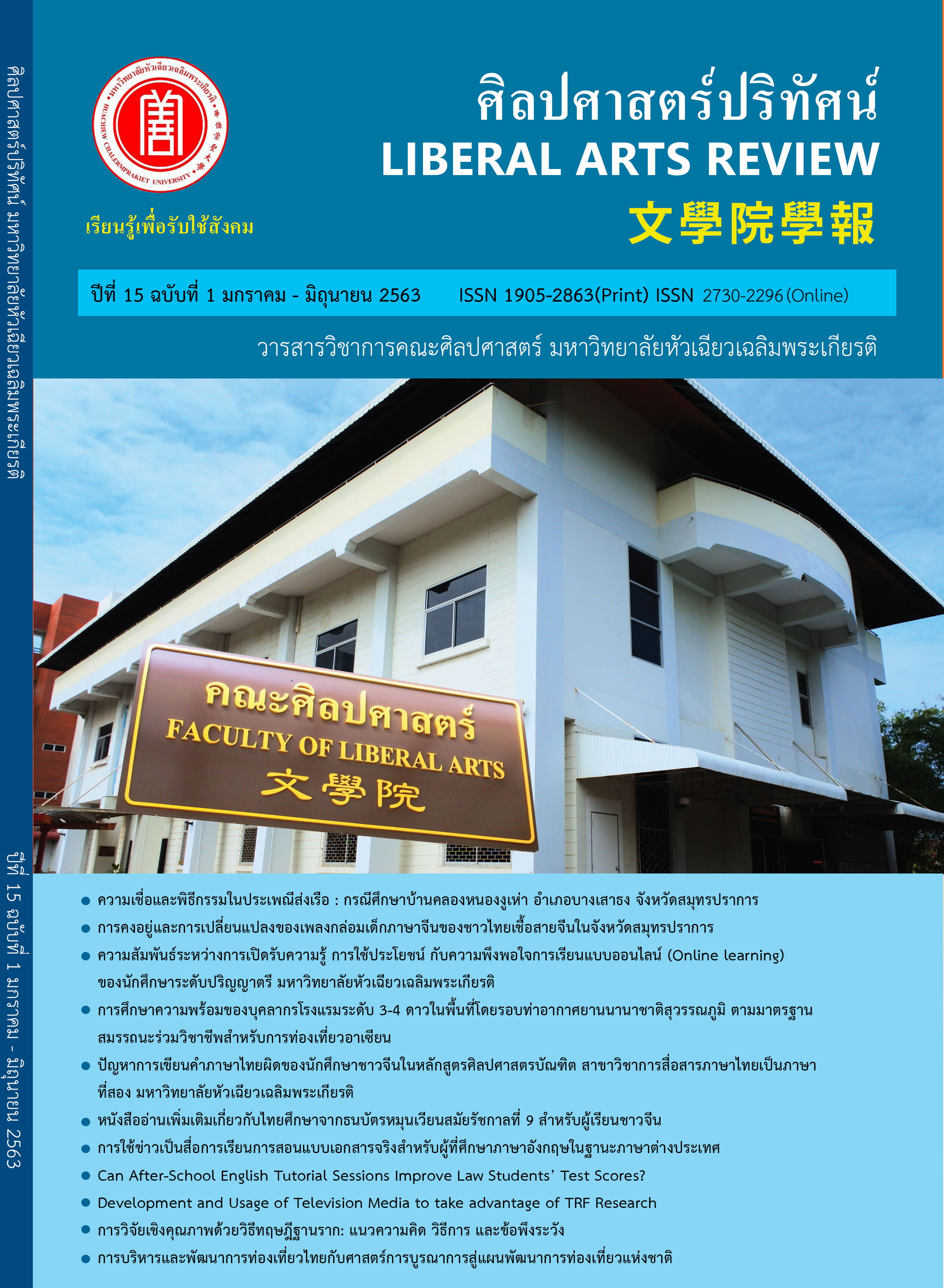Can After-School English Tutorial Sessions Improve Law Students' Test Scores?
Keywords:
English tutorial sessions, English test scoresAbstract
Abstract
The objective of this study is to examine whether an after-school English tutoring program has the ability to improve first-year students’ English test score. Pre- and post-tests were given to students who participated and did not participate in the tutorial sessions. Paired-sample t-test was used to compare the average score of the pre- and post-test of students who participated in the sessions. Independent sample t-test was also used to compare the improvement of the students who participated and did not participate in the sessions. The results show significant improvement on the post-test score of students who participated in the sessions. It also shows that the improvement of students who participated in the sessions was significantly greater than the improvement of students who did not.
References
Al-Jarf, R. S. (2005). The effects of online grammar instruction on low proficiency EFL college students’ achievement. Asian EFL Journal, 7(4), 166–190.
Buzash, M. D. (1994). Success of a Two-Week Intensive Program in French for Superior High School Students on a University Campus...Fulfilling Academic Challenge! Retrieved from http://www.eric.ed.gov/ERICWebPortal/detail?accno=ED403740
Denton, C. A., Anthony, J. L., Parker, R., & Hasbrouck, J. E. (2004). Effects of two tutoring programs on the English reading development of Spanish-English bilingual students. The Elementary School Journal, 289–305.
Guy, R. S., & Lownes-Jackson, M. (2012). Assessing the Effectiveness of Web-Based Tutorials Using Pre-and Post-Test Measurements. Retrieved from http://www.ijello.org/Volume8/IJELLOv8p015-038Guy0793.pdf
Huang, C.-P. (2010). Making English Remedial Instruction Work for Low-Achieving Students: An Empirical Study. Retrieved from http://www.sctc.lhu.edu.tw/m/oaa/synthetic/publish/publish/29/12.%E9%BB%83%E7%A7%8B%E8%90%8D-Making_English_Remedial_InstructionWork_for_Low-_Achieving_Students__An_Empirical_Study.pdf
Jung Won Hur, & Suhyun Suh. (2010). The Development, Implementation, and Evaluation of a Summer School for English Language Learners. Professional Educator, 34(2), 1–17.
Lamsirirak, E. (2017, Nov 16). Teaching Vocabulary in English literature for Thai L2 Students through Productivity-based Instruction. Retrieved from Veridian e-Journal: https://tci-thaijo.org/index.php/Veridian-E-Journal/article/view/103488
Preedeekul, A. (2017, Nov 16). A Comparison of English Learning Achievement and English Listening-Speaking Skills of Higher Education Students with Teach Less Learn More (TLLM) Instructional Model and Conventional Approach. Retrieved from Veridian e-Journal: https://tci-thaijo.org/index.php/Veridian-E-Journal/article/view/109804
Salkind, N. J. (2011). Exploring Research (8th ed.). Pearson.
Sopheak Thon, Kathleen Nicoletti. (2018, Feb 7). The Use of English in an English as a Lingua Franca (ELF) Context: A Study of ASEAN International Students at a Thai University. Retrieved from Veridian e-Journal: https://tci-thaijo.org/index.php/Veridian-E-Journal/article/view/115633
Zimmer, R., Hamilton, L., & Christina, R. (2010). After-school tutoring in the context of no Child Left Behind: Effectiveness of two programs in the Pittsburgh Public Schools. Economics of Education Review, 29(1), 18–28.
Downloads
Published
How to Cite
Issue
Section
License
บทความที่ได้รับการตีพิมพ์เป็นลิขสิทธิ์ของวารสารศิลปศาสตร์วิชาการและวิจัย
ข้อความที่ปรากฏในบทความแต่ละเรื่องในวารสารวิชาการเล่มนี้เป็นความคิดเห็นส่วนตัวของผู้เขียนแต่ละท่านไม่เกี่ยวข้องกับมหาวิทยาลัยหัวเฉียวเฉลิมพระเกียรติ และคณาจารย์ท่านอื่นๆ ในมหาวิทยาลัยฯ แต่อย่างใด ความรับผิดชอบองค์ประกอบทั้งหมดของบทความแต่ละเรื่องเป็นของผู้เขียนแต่ละท่าน หากมีความผิดพลาดใดๆ ผู้เขียนแต่ละท่านจะรับผิดชอบบทความของตนเองแต่ผู้เดียว




